Power Steering Pump Drive Belt Replacement
in the DOHC Mitsubishi 3000GT/Dodge Stealth
by Jeff Lucius
Introduction
The drive belt for the power steering pump should be replaced every 30,000 miles or 3 to 4 years, or if it shows signs of wear. These instructions supplement the instructions in the service manual for replacing the power steering pump drive belt in the DOHC Mitsubishi 3000GT and Dodge Stealth. The tools and supplies required are a hydraulic jack, jack stands, two wheel chucks (blocks of wood are fine), lug wrench or the appropriate socket and ratchet for your wheels, a torque wrench that goes up to 100 ft-lbs, a small flat-head tool for some Stealth owners to remove the wheel center cap, 14-mm open/box-end wrench, 10-mm, 12-mm, 14-mm, and 12-mm-deep sockets and ratchet (a swivel head ratchet may be required), 4" and 10" 1/2"-drive socket extensions, six feet of cord, and safety glasses (for working under the car). The power steering pump drive belt for the DOHC engine is MB172376. Its list price is $16.25 but can be purchased for $12.19 from Tallahassee Mitsubishi and other discount dealers (see a list and contact information on my Garage Page). Please read through all the instructions before starting this procedure. The work below was performed on a 1992 Dodge Stealth R/T Twin Turbo with custom intercooler piping.
Removal
1. Disconnect negative battery cable. With the ignition off, remove the negative battery cable from the battery. Be sure you have security codes for any devices that might need them before you do this.
2. Lift and support car, remove wheel. You must remove the driver's side front wheel to gain access to the drive belts. I have some tips for lifting and supporting the car at my web page 2-raisecar.htm and removing the wheel at my web page 2-tirerotation.htm. Generally, you want to loosen the wheel lug nuts a little, lift the car, rest the front cross member near the rear of the control arm on a jack stand, and finish removing the wheel. Be sure the car is securely and safely supported before you proceed.
3. Front splash shield. Remove the three tapping screws, the two 10-mm bolts, and the five clips with screws from the plastic splash shield in front of the wheel well. The clips with screws are removed by uncsrewing the screw part a little then pulling the whole clip out. If the screw does not want to back out, then try putting a little upward pressure on the grommet by lightly prying around the base with a small screwdriver.
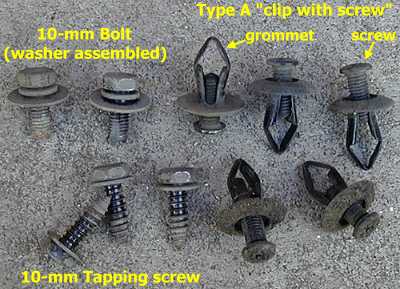
4. Engine room side cover. This cover is behind the driver's side front wheel and conceals the belts and pulleys. Remove the two clips with screws on the bottom and the three 12-mm bolts near the top of the side cover. Set the side cover out of the way.
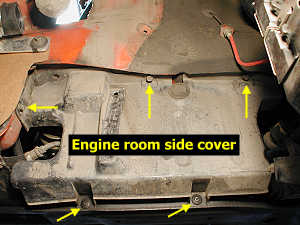
5. Alternator drive belt. Before loosening the tensioner, take a moment to note the tension on the belt between the idler and crankshaft pulleys as shown in the figure at the end of the web page. Loosen, but do not remove, the 14-mm bolt in the center of the tensioner pulley. With a 12-mm socket, rotate the tensioner bolt counterclockwise to lower the pulley and reduce tension on the belt. Stop when the belt is loose enough to remove. Slide the belt off only the crankshaft pulley. If you want to replace this belt I have more information on my alternator drive belt replacement web page.
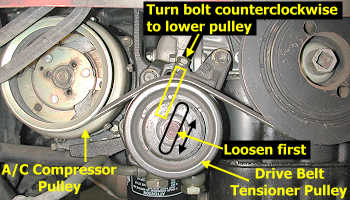
6. A/C suction line. Remove the two 10-mm nuts toward the back, the 12-mm nut on the side, and the 12-mm bolt at the front of the air conditioning suction hose. Lift the hose until it no longer moves easily and tie it off to the hood using a cord.
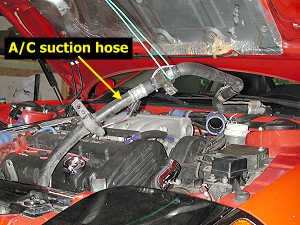
7. I/C pipes. I have aftermarket intercooler pipes and removed enough of the pipes to make access easy to the power steering pump tensioner pulley. If you have the stock I/C pipes, remove the pieces above the power steering belt (on the driver's side of the plenum). Block the openings in the remaining I/C pipes with rags to prevent objects from entering.
8. PS pump drive belt. Using a 14-mm wrench, loosen the two fixing bolts on the tensioner pulley bracket. Remove the bottom of the two bolts and move the adjuster (the pulley) to reduce tension on the belt. If you are going to re-use the belt, put a mark with chalk on the outside edge of the flat side of the belt so that you can re-install it in the same orientation (same side out). Remove the belt. There is not much space to work here, so take your time and be patient.
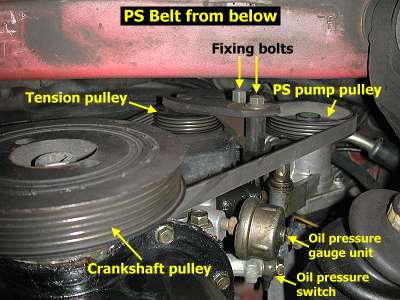
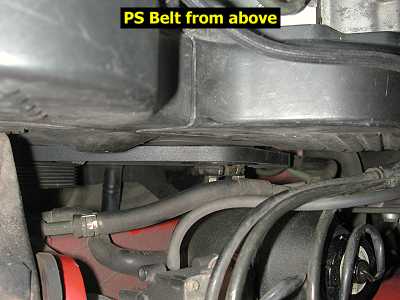
Installation
You should be able to install the PS pump belt from below. Be sure all grooves and ridges are lined up correctly. Correctly tension the PS pump drive belt using its tensioner pulley. Put the lower fixing bolt back in and tighten both bolts so that the tensioner pulley bracket can barely be rotated (tighten both bolts so bracket will not move, then loosen both bolts just enough to let the bracket move). From above, I used 4" and 10" 1/2"-drive socket extensions to get enough leverage on the tensioner pulley bracket to tighten the belt properly. With one hand apply leverage (I used my right hand) and with the other hand tighten the lower bolt. The bracket pivots around the upper bolt. Check the tension as shown in the diagram below and when correct tighten both bolts (31 ft-lb torque or 43 N-m). Put the alternator drive belt back on the crankshaft pulley and adjust its tension using its tensioner pulley.
Before installing the plastic covers and wheel, temporarily install the IC pipes and the battery negative cable and start the engine to check the operation of both belts. If a belt squeals it is either misaligned or too loose. Spray a little water on one belt at a time to see which is squealing. A misalligned belt will stop squealing for a very short time after water is sprayed on it, but the squealing quickly comes back louder than before. If the belt is loose, the squealing will immediately get louder. Also note that there is just a little play in how the alternator bolts in. If there is a misalignment problem with alternator drive belt, loosen all four bracket mounting bolts on the alternator (this may require again removing an IC pipe, more details about the alternator on my web page concerning alternator removal), reposition the alternator, and tighten the bolts to see if this helps. Do not tighten the belt too much because this can lead to shaft bearing failure over time.
Here are some links concerning drive belt adjustment.
http://www.gates.com/brochure.cfm?brochure=1026
http://www.ridgeautoparts.com/tips/the_charging_system1_2.htm
http://www.utfleets.com/library/features/accessory_drive_belts.htm
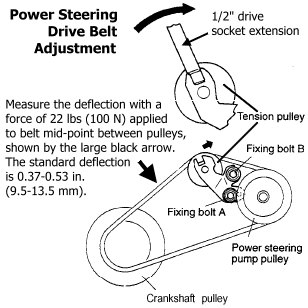
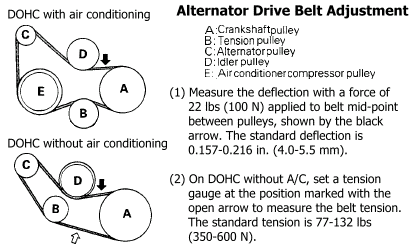
After you are satisfied the drive belts are installed correctly, disconnect the battery negative cable and re-install the other parts. Tips for mounting the wheel are on my web page 2-tirerotation.htm. The last thing to do is re-connect the negative battery cable.
Page last updated September 7, 2002.








